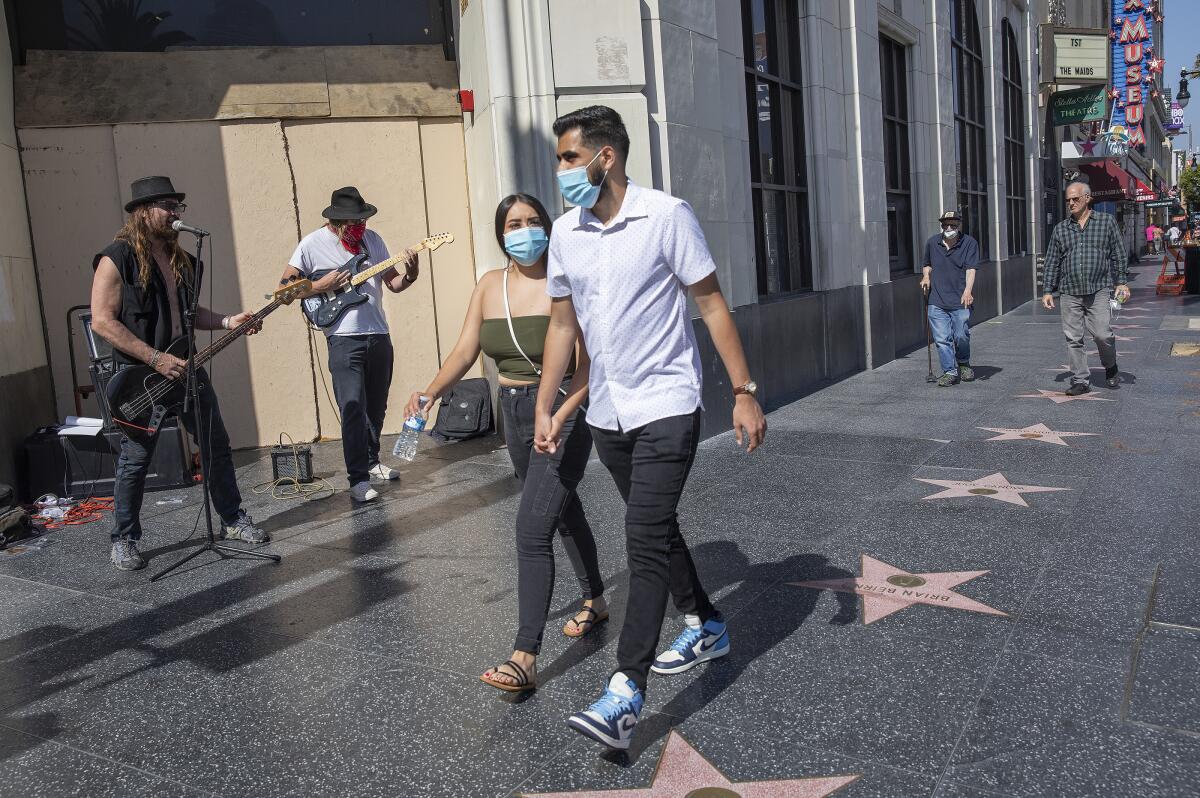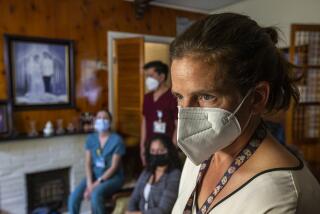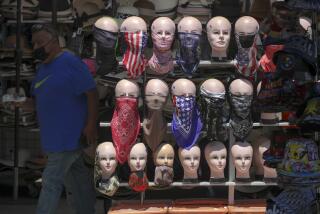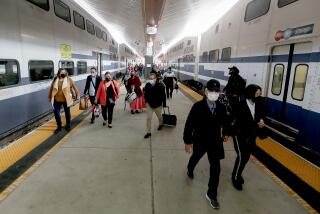L.A. County coronavirus cases mount, but efforts to slow spread appear to be working, officials say

Even as Los Angeles County continues to report high numbers of new coronavirus cases each day, the county remains well-positioned in its fight to slow the virus’ spread, making it possible for more sectors of the economy to reopen, health officials maintained Friday.
The county reported 1,414 new cases of the virus and 38 related deaths. Eighteen of the deaths were among residents in skilled nursing facilities, who now account for a total of 1,437 deaths.
But two key indicators — the positivity rate and average number of daily hospitalizations — have continued to remain relatively steady, while average daily deaths have declined, officials said.
“The most important data continues to be looking at our death data and our hospitalization data and our rate of positivity, and ... all of the indicators really point to the fact that we are fairly stable and that we in fact continue to slow the spread of COVID-19,” Barbara Ferrer, the county health director, said Friday.
More than 891,000 people had been tested and received their results, with about 8% testing positive. That percentage has held steady since late May, which experts say suggests that the county is seeing more cases due to more testing, not necessarily increased community transmission.
There were 1,446 confirmed COVID-19 patients in county hospitals Friday, with 29% in intensive care and 21% on ventilators. The average daily number of hospitalizations has been decreasing since late April, Ferrer said, although she did note there has been a slight increase over the past three days. That could be because most hospitals are now testing all patients for COVID-19, even those who are being treated for unrelated issues, she said.
The seven-day average of daily deaths has also been trending downward since April 12, Ferrer said. The average reached its highest in early May, when 45 to 46 people were dying each day. In early June, the rate had slowed to 20 to 30 deaths a day, she said. The seven-day average stood at 28 on Friday, according to the Department of Public Health dashboard that tracks reopening metrics.
“As a reminder, the death and hospitalization numbers we’re showing today represent the results of actions that we took about three to four weeks ago,” Ferrer said. “Many businesses and spaces have reopened in the last month, so we’ll be watching all of these indicators carefully to see what impact reopening is having in our community.”
That came two days after both the county and the state recorded their largest single-day totals of new coronavirus infections. California reported 4,291 new cases Wednesday, with 2,129 of them in L.A. County. Health officials said the total was fueled by a backlog of test results that accounted for roughly 600 of the new L.A. County infections.
Amid the continued rise in case counts, the county announced that a slew of businesses could reopen Friday as the region continues to relax stay-at-home orders put in place in March to slow the virus’ spread.
The list includes bars, wineries, breweries and tasting rooms, personal care services — including esthetician, skin care, cosmetology, electrology and nail salons, body art and tattoo parlors, microblading and piercing shops and massage studios — card rooms, satellite wagering facilities and racetracks without spectators.
In the face of the reopenings, Gov. Gavin Newsom took the dramatic step Thursday of ordering all Californians to wear face coverings while in public or high-risk settings.
L.A. County has had a similar order in place since mid-May. On Friday, Ferrer emphasized the importance of following the rule, even if a person doesn’t consider themselves to be at high risk for becoming seriously ill.
“It’s not about you. It’s about all the other people that could be around you,” she said. “We just have to take care of each other. We’re in the middle of a pandemic, nothing like we’ve ever experienced, and we have an opportunity to care for each other and we do that by being extraordinarily respectful and putting on those masks.” She said that face coverings are expected to be required in public places for “weeks to come.”
Outbreaks in institutional settings continue to be one driver of L.A. County’s high case counts, officials said Friday.
About 22% of the county’s total cases — 17,219 — are associated with such settings, which include skilled nursing facilities, assisted and supportive living homes, shelters, treatment centers, food and retail outlets and workplaces. They include 10,973 cases among institutional residents and 6,246 among staff. The county has investigated 657 such settings with at least one suspected or confirmed case, and investigations remain ongoing at 522 sites.
Residents living at these institutions also account for 1,618 deaths, officials said Friday, which is more than half of the total number of COVID-19 deaths reported by the county so far. In addition to the 1,437 deaths among skilled nursing facility residents, 181 residents of other congregate facilities have died, officials said.
The county has recorded 1,061 confirmed cases at county, state and federal prison facilities, and 548 cases among people experiencing homelessness, officials said.
California now has recorded more than 169,600 coronavirus cases and more than 5,400 deaths.
Statewide, hospitalizations have remained relatively flat for the last six weeks.
But some areas have seen increases. Last week, there were an average of 91 people hospitalized per day with confirmed or suspected coronavirus infections in Ventura County, the highest number since early April. That’s a 75% increase from each of the previous two weeks, a Times analysis found.
Orange County and the San Joaquin Valley have seen 76% and 45% increases in intensive care unit hospitalizations, respectively, over the last six weeks.
State officials are monitoring areas experiencing elevated disease transmission or increasing hospitalizations or both in 10 counties: Contra Costa, Fresno, Imperial, Kern, Kings, Riverside, San Joaquin, Santa Barbara, Stanislaus and Tulare. The state also is monitoring L.A. County for the possibility of elevated transmission.
Riverside and San Bernardino counties this week reported their highest ever one-day increases in coronavirus cases. On Thursday, Riverside added 516 cases to their total count, and the San Bernardino count jumped by 440 cases. Both Inland Empire counties beat out records set earlier in the week.
“Mother’s Day, Memorial Day, protests — there’s no one event or no one occasion that we can point to” for the uptick in cases, said Felisa Cardona, a spokeswoman for San Bernardino.
San Bernardino County also reported a new high for COVID-19 hospitalizations, with 229 confirmed and 64 suspected patients in county hospitals, officials said. About 90 coronavirus patients were being treated in ICU beds.
In Riverside County, 285 people remained hospitalized as of Thursday, a 10.9% increase from the previous day, officials said. There were 75 COVID-confirmed patients being treated in intensive care units.
Times staff writers Kristi Sturgill, Luke Money, Phil Willon, Rong-Gong Lin II and Iris Lee contributed to this report.
More to Read
Sign up for Essential California
The most important California stories and recommendations in your inbox every morning.
You may occasionally receive promotional content from the Los Angeles Times.











